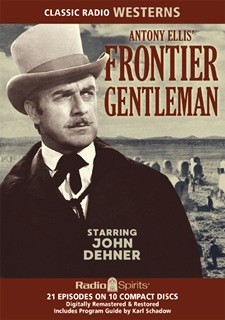
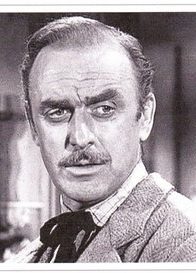 Frontier Gentleman (February 2, 1958–November 16, 1958) aired “The Cannibal” on May 11, 1958 as the 15th of the classy, well produced, but short-lived series’ 41 episodes. This is but the fifth episode of Frontier Gentleman we have offered and the first since February of 2023, almost two and a half years ago.
Frontier Gentleman (February 2, 1958–November 16, 1958) aired “The Cannibal” on May 11, 1958 as the 15th of the classy, well produced, but short-lived series’ 41 episodes. This is but the fifth episode of Frontier Gentleman we have offered and the first since February of 2023, almost two and a half years ago.
Since there are always those coming for the first time to any individual episode of any program showcased here from week to week, below is the general background, a thumbnail sketch of this program, at the end of which there will be a few specific comments on this week’s featured episode of Frontier Gentleman.
The brief duration of this quality western (10 months) had more to do with the fact that by 1958 television had become the dominant entertainment venue in America, and this new medium was already into reruns of any number of TV westerns. Frontier Gentleman, while not groundbreaking as was Gunsmoke (on radio and TV, for instance), and while exhibiting a novel approach of its own when it came to character over action in most cases, still could not break through the glass ceiling—or glass television screen—and last longer than it did.
Speaking of the novel approach the series took in portraying the western, its protagonist was of a different stripe altogether. This so-called frontier gentleman was an Englishman. His name was J. B. Kendall and he had spent most of his career as a British Cavalry officer in the Punjab region of Northwest India/Eastern Pakistan. He accepts a position as a correspondent for The London Times to travel to the Wyoming and Montana territories of the still-forming United States in the post-Civil War 1870s. His mandate is to report first-hand what he sees and learns of this still untamed land, with its warring Indian tribes, sometimes successful, often-times failing bouts of exploration, colonization, and pretty much still lawless time in the young country.
The inestimable TV, film, and radio actor John Dehner (1915-1992, photo top right) would win the role of J. B. Kendall and he played it to perfection, even answering the question as to why his British accent seemed almost unnoticeable. Dehner’s distinctive voice was one of his recognizable calling cards across his numerous radio appearances, placing him in the top rank of favorite radio voices along with those of Orson Welles, William Conrad, and Frank Lovejoy. Non-plussed when this top-notch western series was cancelled, Dehner was hard at work on another western series within a week, none other than Have Gun—Will Travel, as the well-educated but tough gun-for-hire, Paladin. For more on Dehner’s background, of which I found numerous items of interest, click on the Have Gun—Will Travel link above. John Dehner died in 1992 of complications from emphysema and diabetes.
Noted radio scripter Antony Ellis (1920-1967) was born English but became a naturalized American citizen. He capped his unbridled fascination for the American Old West by writing each episode of Frontier Gentleman. They were noted for their historical accuracy and depth of character development within the half-hour time restriction. He and series star John Dehner were good friends in real life. Antony was married to Georgia Ellis (1917-1988), who starred as Kitty in radio’s Gunsmoke.
Future award-winning film composer Jerry Goldsmith (1929-2004) would be responsible for the show’s musical theme. Of his many film scores, a few of the more recognizable would include Alien (1970), L. A. Confidential (1997), Patton (1970), The Sand Pebbles (1966), The Wind and the Lion (1975), Chinatown (1974), Planet of the Apes (1968), Logan’s Run (1976), Star Trek: The Motion Picture (1979), and The Lost World: Jurassic Park (1997). From his wiki page, “Over the course of his career, Goldsmith received 18 total Academy Award nominations, making him one of the most nominated composers in the history of the Awards. Despite this, Goldsmith won only one Oscar, his score for The Omen (1976). This makes Goldsmith the most nominated composer to have won an Oscar only on one occasion.” Jerry Goldsmith died of colon cancer in 2004.
“The Cannibal” is a perfect example illustrating the adage that sometimes less is more. J. B. Kendall is exploring the wilds of Wyoming and finds himself, along with other stagecoach passengers, stranded in a way station as a rain storm has halted their progress. While they become resigned to their plight and settle in for an indeterminate wait, they begin to talk as people are wont to do in close quarters with nothing else to occupy their time. A story gradually emerges about missing miners, and though dark secrets are slowly unveiled there is nothing in the story having anything to do with cannibalism. So why the title? Only by listening carefully will the secret truth of “The Cannibal” be revealed. Without a gun being fired or a drop of blood being spilled, writer Antony Ellis has written a first class script in the western tradition.
(The linked CD at the top includes this episode and 20 more, all digitally remastered and restored.)
Play Time: 24:30
{Airing on a Sunday evening in early May of 1958, this episode of Frontier Gentleman was all the incentive the neighborhood gang needed to set them off to the corner newsstand the following day after school. They were already enamored of the western genre due to the ever-present proliferation of western dramas on TV in 1958, some of the more memorable being The Rifleman, Wanted: Dead or Alive, Lawman, Bat Masterson, Gunsmoke, Wagon Train, Have Gun–Will Travel, Cheyenne, The Adventures of Rin Tin Tin, Broken Arrow, Cimarron City, Death Valley Days, Dick Powell’s Zane Grey Theatre, Fury, Sugarfoot, Tales of the Texas Rangers, Tales of Wells Fargo, Tombstone Territory, and a handful of others including Zorro if you wish to count it. Though many western pulp magazines had seen their last rodeos years earlier, several were still around for the gang to pick through. Double-Action Western (1934-1960) had the longest run of the three pulps shown below and was a bi-monthly in 1958. Famous Western (1937-1960) began its run with an irregular schedule but eventually settled into a mostly bi-monthly run for most of its years on America’s bookstore shelves, including 1958. Western Action (1936-1960) began publishing under the title of Western Action Novels Magazine but in 1938 adopted the name it ran under until its demise in 1960. Its overall schedule was slightly more erratic than the others shown below, though it too, like the others, was a bi-monthly in 1958. It is interesting to note that all three publications began within 3 years of each other in the 1930s and closed their barn doors for the final time in April and May of 1960.}
[Left: Double-Action Western, 6/58 – Center: Famous Western, 4/58 – Right: Western Action, 5/58]
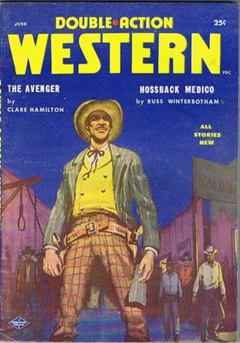
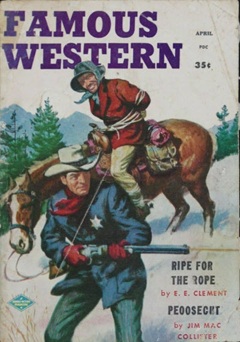
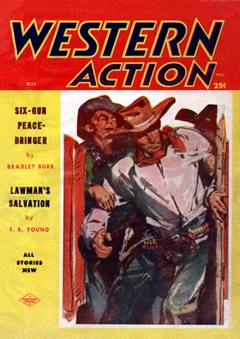
To view the entire list of weekly Old Time Radio episodes at Tangent Online, click here.